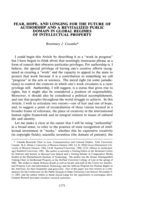“Fear, Hope, and Longing for the Future of Authorship and a Revitalized Public Domain in Global Regimes of Intellectual Property”
“Fear, Hope, and Longing for the Future of Authorship and a Revitalized Public Domain in Global Regimes of Intellectual Property”

“Fear, Hope, and Longing for the Future of Authorship and a Revitalized Public Domain in Global Regimes of Intellectual Property.” De Paul Law Review 52: 1171-1191.
Link to article
Abstract: Authorship is the special privilege of having one’s creative efforts recognized as creating a work and the capacity to appeal to the state to protect that work because it is a contribution to something we call progress in the arts or sciences. So-called copyrighting of culture will only further imperil the public domain; it may enable elites to enforce forms of censorship within communities; it has the potential to freeze cultural identities, and shut down desirable hybridities. Many progressive North American scholars of intellectual property have placed their energies behind the revitalization of a cultural public domain and the maintenance of a creative commons. To the extent that we are committed to the cultural public domain, we need to consider a wider range of activities and practices than those that copyright law traditionally recognized as acts of authorship and those most characteristic of Western creators. Intellectual property rights are human rights, as are rights of access to the public domain, rights of collectivities to maintain their cultural integrity and to participate in decisions involving the use of their cultural heritage. By considering both intellectual property rights and rights to the public domain within a larger human rights framework, the social, economic and cultural rights of others assume a new significance.
Date Published: 2003
Publisher: De Paul Law Review
Publisher Website: https://via.library.depaul.edu/law-review/